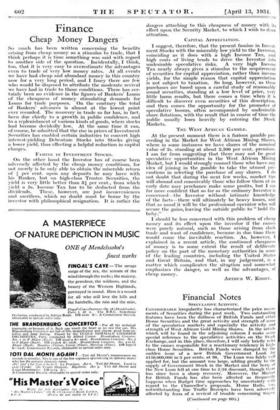Finance
Cheap Money Dangers So much has been written concerning the benefits arising from cheap money as a stimulus to trade, that I think perhaps it is time something was said with regard to another side of the ,question. Incidentally, I think, too, that it is very easy to overestimate the advantages even to trade of very low money rates. At all events we have had cheap and abundant money in this country now for a very long period, and I fancy there are few who would be disposed to attribute the moderate revival we have had in trade to those- conditions. There has cer- tainly been no evidence in the figures of Bankers' Loans of the cheapness of money stimulating demands for Loans for trade purposes. On the contrary the total of Bankers' advances is almost at the lowest point ever recorded. The recovery in trade so far has, in fact, been clue chiefly to a growth in public confidence, and to a replenishment of various kinds of goods, where stocks had become decidedly low. At the same time it can, of course, be admitted that the rise in prices of Investment Securities has enabled certain industries to convert high interest-yielding Debenture Stocks into Stocks giving a lower yield, thus effecting a helpful reduction in capital charges.
FAMINE IN INVESTMENT STOCKS.
On the other hand the Investor has of course been adversely affected by the cheap money conditions, for not merely is he only able to obtain the miserable return of 1 per cent. upon any deposits he may have with his Banker, but on high-class Trustee Securities, the yield is very little better than 81 per cent., from which ield a 5s. Income Tax has to be deducted from the dividends. These, however, are just inconveniences and sacrifices, which no doubt must be borne by the investor with philosophical resignation. It is rather the dangers attaching to this cheapness of money with its effect upon the Security Market, to which I wish to draw attention.
CAPITAL APPRECIATION.
I suggest, therefore, that the present famine in Invest- ment Stocks with the miserably low yield to the Investor, coinciding as it does with a high Income Tax, and high costs of living tends to drive the Investor into undesirable speculativerisks. A very high Income Tax nearly always gives a stimulus th the acquirement of securities for capital appreciation, rather than income yields, for the simple reason that capital appreciation is not subject to taxation. So long, however, as these purchases are based upon a careful study of reasonably sound securities, standing at a low level of price, very little harm results, but there comes a time when it is difficult to discover even securities of this description, and then comes the opportunity for the promoter of speculative booms, often accompanied by undesirable share flotations, with the result that in course of time the public usually loses heavily by entering the Stock Markets.
THE WEST AFRICAN GAMBLE.
At the present moment there is a furious gamble pro- ceeding in the Market for West African Mining Shares, where in some instances we have shares of the nominal value of 2s. standing at about 2,500 per cent. premium. I am far from suggesting that there may not be great speculative opportunities in the West African Mining Market, but I would strongly counsel those who have any idea of joining in the gamble *to take the utmost pre- cautions in selecting the purchase of any shares. I do not doubt that during the next few weeks, market tips will abound and conceivably those who follow them at an early date may perchance make some profits, but I am far more confident that so far as the ordinary 'Investor is concerned—the Investor without intimate knowledge of the facts—there will ultimately be heavy losses, and that as usual it will be the professional operator who will secure the gains, leaving the outside public_ to "hold the baby."
I should be less concerned with this problem of cheap money and its effect upon the investor if the causes were purely natural, such as those arising from slack trade and want of confidence, because in due time there would come the inevitable reaction. As, however, I explained in a recent article, the continued cheapness of money is to some extent the result of deliberate policy on the part of the monetary authorities in some of the leading countries, including the United States and Great Britain, and that, in my judgement, is a matter which complicates the situation and somewhat emphasizes the danger, as well as the advantages, of cheap money. ARTHUR W. KIDDY.
















































 Previous page
Previous page